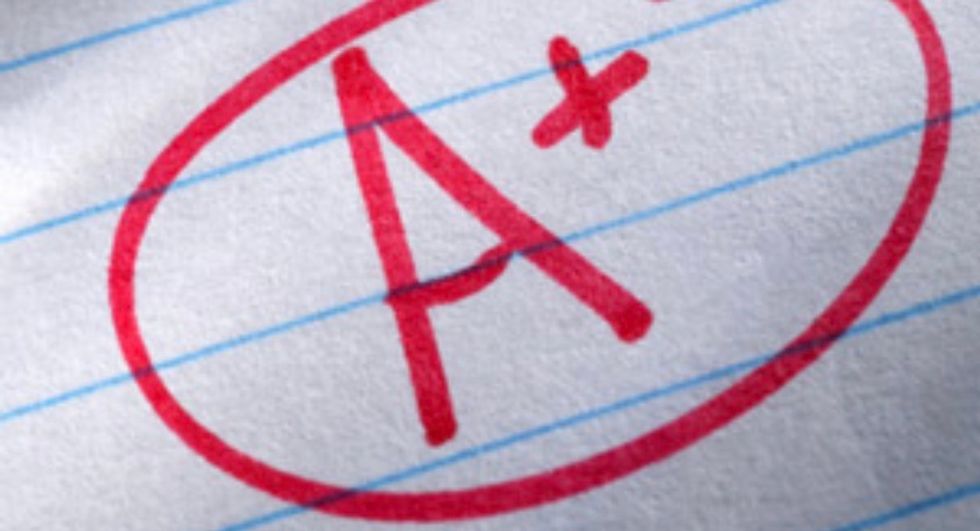Time is a precious rarity for the college student, so you want to effectively make the most of the time you have to maximize the benefits of your studying.
Strategize

Forbes
In order to succeed, the first step you need to take is to create a strategic approach to your studies. I recommend using a planner or agenda to help you stay organized. Using this planner or agenda, plan out all the days you are working, interning, or volunteering. Based on how much time you have left, devote a certain number of hours per week or per day to studying. Ensure that you have plenty of time not only to complete your assignments, but also to allow yourself an adequate amount of time to study for any upcoming quizzes, tests, or exams. Studying is easier and more effective when broken up into chunks. So say you have ten hours in one week to devote to studying for an exam on Friday afternoon. Instead of cramming and pulling an all-nighter, devote two hours a day over five days to study. Studying as you go has been proven to improve memory retention, so when it is time for the exam, all you need is a quick refresher of all the concepts you have been studying over the past few weeks. At the end of every week, study all the material you learned in that week. The same concept can be applied for papers. If you know you have a term paper due in a week, then work on maybe a few paragraphs or a page everyday so you don't rush to finish it on the due date.
Take notes effectively

Notes can be enormously helpful for studying or if your professor allows an exam to be open-note, then if taken properly, notes can ensure you will do well. Notes should be a summary of the most important concepts, dates, people, vocabulary terms, and any information that you find challenging or difficult to remember. Notes should be kept fairly brief- you do not want to have lengthy notes because it will be harder to remember the information. Notes are designed to jog your memory. They should also be fun to create and review, so the unique visuals will make the information contained within the notes more memorable. Creating concept maps to describe processes, theories, or connected ideas is another great way to maximize the power of note-taking. Concept maps create a visual depiction of what you are learning. It is better if your notes are creative, so break out the colored pens or markers, highlighters, and feel free to doodle. Write in mnemonics to hep you remember, or if you can think of a real-world example of a phenomenon, write that in too!
Speak it into success

English Harmony
It has been scientifically proven that saying information aloud, as opposed to just reading it silently, creates a stronger memory in the brain. What I do when studying, is read alternate between reading the notes in my head and then saying them aloud. An even better idea is to teach the information to someone else. If you see a real-world example of a concept you are studying, explain it to a family member or a friend nearby. Do a fun lecture for your friends on an interesting topic you are studying. Again, the idea that teaching others helps improve comprehension and memory is backed by science. So get a glass of water or some throat lozenges and get ready to use your voice to improve your grades!
Create meaningful study guides

Buzzfeed
Study guides should be short and sweet- a condensed version of your notes and should pertain only to the information you know will be likely on the exam. When creating a study guide, do a brain dump on a separate sheet of paper and write down all the information off the top of your head you know will likely be covered on the exam. Then, go through past quizzes and assignments and take a close look at the questions you got wrong or struggled on. Go through your text and notes and review the concept and be sure to include it on the study guide, along with any information you have trouble remembering or understanding. A good idea is to highlight the most crucial information. Divide a sheet of copy paper (or colored paper without lines) and devote a section of the paper to each topic covered on the exam so it is organized. It is better to make your study guides by hand, as opposed to on a computer, because writing information down is better for memory retention. However, any study guides you created electronically can be used as a supplement or an extra resource.
The sweet smell of success

The New York Times
According to science, of all our five senses, the sense of smell is the most powerful trigger of memory. It may sound quirky, but assign a unique scent to each of your courses. The scent should be an unfamiliar scent, so do not stick with a fragrance you are familiar with and already have memories associated with. This does not have to be costly- you could just buy room sprays or some affordable perfume or cologne at a drug store or a discount store, or even use free fragrance samples from online purchases! Spray your notes and study guides so that each time you study, you are associating that scent with the information you are learning, helping to create connected memories in your brain. Then, when it is time for the exam, if you are taking it online in your dorm or home, then spray some room spray, or before you enter the classroom or building, spray the cologne or perfume on your wrist outside. Inhale, take in the scent, and let the memories come back to you.
Color code

The Learning Scientists
Using colors actually helps you remember the information! We are so familiar with black or greyscale ink, that seeing information in that ink does not really stand out in our memory. So when we use bright colors to write and highlight with, the brain takes notice. Writing on colored paper also has the same effect! A good way to stay organized and create associations is to assign a color code to each class. So for one class maybe write in red ink, and for another class, write in green ink. Notes, concept maps, and study guides should be especially colorful. Color coding can also apply to highlighting. Create a color code on what the information means based on the highlighting. For example, maybe highlight information that you can never remember in yellow, highlight important vocabulary words in orange, and highlight information that you have difficulty understanding in pink.
Reach out to your professor

Pearson
Finally, remember that one of the best resources you have for your studies is your professor. Your professor is here to help you and wants you to succeed. It may be intimidating, but if you are having trouble with a concept, reach out to them via email, or better yet call them on their office telephone (with their permission) or visit them during office hours. If you want more information on a topic or guidance on how to find more information (after going through all the available course materials), then contact your professor. They will most likely be more than happy to help you, and you will greatly benefit from it!
I wish you all the best for this semester! Believe in yourself, put in the work, and you will succeed!
- Tips For A Successful Semester ›
- 10 Tips For A More Successful Semester ›
- 10 Study Tips For A Better Spring Semester ›
- Study Tips For Your Best Semester Yet ›
- Studying Tips For A Successful First Semester ›





 people sitting on chair in front of computer
people sitting on chair in front of computer



 all stars lol GIF by Lifetime
all stars lol GIF by Lifetime two women talking while looking at laptop computerPhoto by
two women talking while looking at laptop computerPhoto by  shallow focus photography of two boys doing wacky facesPhoto by
shallow focus photography of two boys doing wacky facesPhoto by  happy birthday balloons with happy birthday textPhoto by
happy birthday balloons with happy birthday textPhoto by  itty-bitty living space." | The Genie shows Aladdin how… | Flickr
itty-bitty living space." | The Genie shows Aladdin how… | Flickr shallow focus photography of dog and catPhoto by
shallow focus photography of dog and catPhoto by  yellow Volkswagen van on roadPhoto by
yellow Volkswagen van on roadPhoto by  orange i have a crush on you neon light signagePhoto by
orange i have a crush on you neon light signagePhoto by  5 Tattoos Artist That Will Make You Want A Tattoo
5 Tattoos Artist That Will Make You Want A Tattoo woman biting pencil while sitting on chair in front of computer during daytimePhoto by
woman biting pencil while sitting on chair in front of computer during daytimePhoto by  a scrabbled wooden block spelling the word prizePhoto by
a scrabbled wooden block spelling the word prizePhoto by 
 StableDiffusion
StableDiffusion
 StableDiffusion
StableDiffusion
 StableDiffusion
StableDiffusion

 women sitting on rock near body of waterPhoto by
women sitting on rock near body of waterPhoto by 
 Photo by
Photo by  Photo by
Photo by  Photo by
Photo by  Photo by
Photo by  Photo by
Photo by  Photo by
Photo by  Photo by
Photo by  Photo by
Photo by  Photo by
Photo by  Photo by
Photo by 








